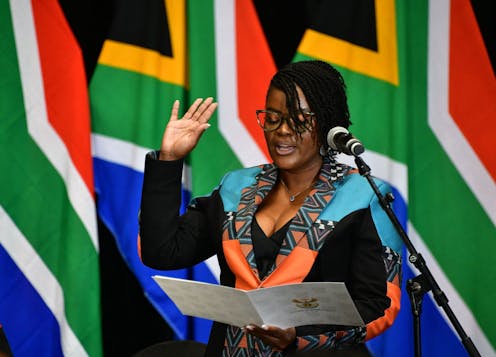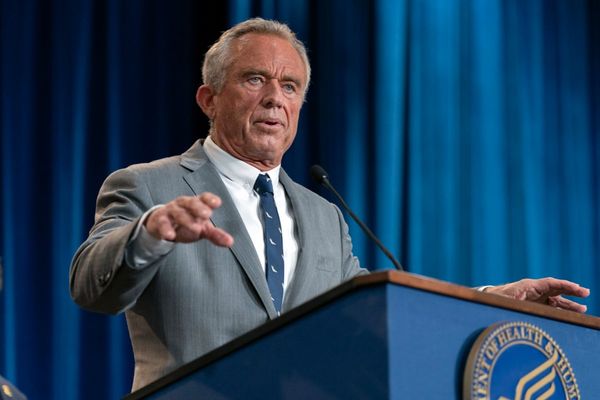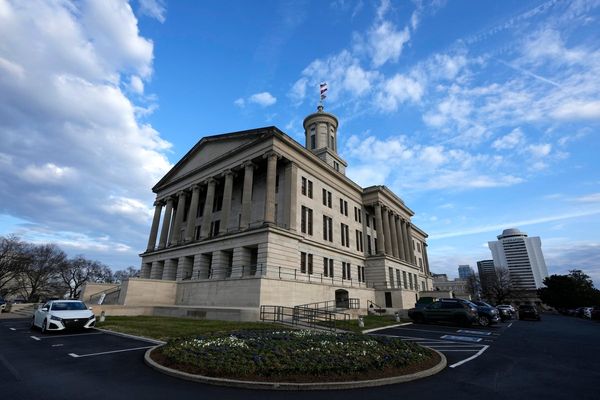
When South African president Cyril Ramaphosa named Nobuhle Nkabane as the minister of higher education on 3 July 2024, many people I know in the sector had to Google her name. Dr Nkabane had been deputy minister of mineral resources and energy since August 2021.
Nkabane enters an arena that’s ready for new political leadership and has senior figures who are ready, willing and able to work with her. Universities South Africa, which represents the country’s 26 public universities and has a clear-eyed view of the sector’s priorities, has welcomed Nkabane’s appointment.
She will need this kind of support: in her new position, Nkabane inherits a portfolio rife with challenges. Despite positive changes over the past 30 years, higher education and labour market outcomes are still skewed by race. Demographic changes have been slow in academic careers. The history of institutional inequity persists.
The minister and her team oversee a sector that, according to government statistics, includes about 1.3 million students in public and private higher education institutions (more than 80% in public universities); close to 600,000 students in public Technical Vocational Education and Training (TVET) colleges and 86,000 in private colleges; and about 143,000 students in community colleges.
I saw some of the issues within the sector first-hand during several years as a government education official, with roles related to governance and management support in university education. I left the department of higher education and training in 2023 to join academia as a higher education policy scholar.
I suggest there are three big priority areas the minister must urgently address. One, she must rebuild trust in and across the higher education system. Second, she needs to push for sustainable and stable funding of the higher education and training system. And, third, she must oversee the development of meaningful capacity across the post-school education and training system.
She and her team won’t have to reinvent the wheel. The policies that can shape the kind of higher education and training system South Africa needs already exist; they were developed by experts both within and outside the government. What’s required now is some tough decision-making. Rather than establishing new planning task teams, the minister should give existing policy goals time and meaningful support to mature. Creating new wish lists without providing the funding and capacity necessary to make them work will further weaken the sector.
Rebuilding trust
Globally, trust in universities has fallen. The same is true in South Africa and is perhaps inevitable in a society with high levels of unemployment and inequality – especially when the higher education system itself remains inequitable.
A 2022 scholarly review of 25 years of policy changes described the period since 2016 as being about “calling the system to account”. They argued that equity was a key dimension of quality in higher education, and one in which the country was under-performing.
Other events that have harmed trust in the system include the student-led #feesmustfall and related protests; the COVID pandemic, which laid bare the continued inequities in higher education; and the rocky introduction of a new student funding policy in 2018.
The serious administrative failures of the National Student Financial Aid Scheme (NSFAS) have also been a key breach of trust in the system.
The minister must ensure that the scheme is meeting its principal commitments and collaborating with institutions. It must work together with and within the higher education and training ecosystem where shared accountability is possible. An effective, efficient and trusted financial aid scheme would be a powerful glue for systemic trust in higher education.
Sustainable, stable funding
Post-school institutions, like so much else in South Africa, are under severe financial pressure. Even though the Department of Higher Education and Training’s budget grew at a rate faster than most government departments’ between 2019 and 2023, the core funding to institutions grew at a rate well below inflation because the bulk of the budget went to supporting NSFAS’s budget.
Only about 50% of the scheme’s funding comes back to universities in the form of tuition fees. It does not resolve the overall problems of student debt. Instead, universities are forced to write off the majority of student debt, which is attributed primarily to students who are not able to pay fees and do not qualify for financial aid or other bursaries.
South Africa lacks a comprehensive student financial aid model which could improve access to different levels of higher education and include support for different levels of financial need. In January 2024, former minister Blade Nzimande announced a new loan scheme to support the so-called “missing middle” students who don’t qualify for aid but can’t afford to pay. But allocations have not yet been made and the sustainability of the new scheme is uncertain.
Read more: In South Africa, university is open to rich and poor – but what about the missing middle?
Student financial aid is not the only issue straining the system. There’s also been a massive reduction in infrastructure and earmarked funding which supports systemic transformation goals (such as student success initiatives, staff transformation and new infrastructure development). Difficult political choices must be made about where funding should be directed.
More than just universities
One of the minister’s most important mandates is to oversee what the National Plan for Post-School Education and Training describes as “an integrated, coordinated and articulated post-school system”.
This is a reminder that not all further education happens at universities. There must be a range of good quality opportunities for those who complete school (and those who leave school before completion).
Following the plan means funding capacity development in the country’s 50 TVET and nine community colleges.
There have been near-constant changes in the TVET space over the last few decades. No real time and funding is provided to allow these developments to mature, which is damaging for the colleges.
The minister will face tough decisions during her term. But if she can build collaboration and improve policy implementation based on mutual trust between herself, the Department of Higher Education and Training and post-school institutions, there is hope.
Thandi Lewin does not work for, consult, own shares in or receive funding from any company or organisation that would benefit from this article, and has disclosed no relevant affiliations beyond their academic appointment.
This article was originally published on The Conversation. Read the original article.







